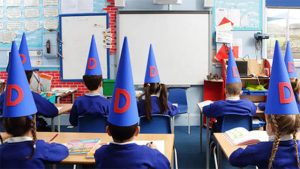Home » Commentary » Opinion » ‘Progressive’ education policy: a cure worse than the disease
· Spectator
 Despite the now indisputable evidence that Australia’s education system has been led down a deleterious path, the proposed cure might well be worse than the disease. The solution being put forward is a doubling–down on progressive approaches that are responsible for the decline in the first place.
Despite the now indisputable evidence that Australia’s education system has been led down a deleterious path, the proposed cure might well be worse than the disease. The solution being put forward is a doubling–down on progressive approaches that are responsible for the decline in the first place.
Australia’s education ministers came up with a new blueprint at the Education Council meetings held on Wednesday and Thursday. Unfortunately, rather than a mea culpa for the trajectory that policy has been steered, there appears to be little relief for the concerned parents and employers across the country.
While the education gathering resulted in a new ‘Alice Springs Declaration’, it is devoid of clever solutions and constructive strategy — to end piecemeal policy and programs — needed to rebuild confidence in the policy direction.
Among the remedies agreed upon is the hastening of the upcoming review of the Australian Curriculum. The rationale is an imminent need to upgrade our so-called ‘21st-century skills’ — while blind to our demonstrable deficits in reading, maths, and science performance — and to enhance students’ wellbeing.
The skills our education ministers see as “central to contributing to Australia’s knowledge-based economy” are evidence-free, progressive obsessions like: “imagination, discovery, innovation, empathy, and developing creative solutions to complex problems.”
Equipping future workers with a booster to their empathy credentials is a far cry from the tangible, practical skills that are needed to prepare youngsters for the workforce. This is particularly salient in light of the economy’s long-term slump in productivity (which recently went negative — yes, we are literally becoming less productive!).
Not only is there little reason to be confident in the direction that has been set for imparting work-ready skills, the educational focus is not on arresting the decline in the core academic fields, but on tangential concerns that are right out of the progressive educationalist playbook.
The new declaration’s focus is to make students: more confident and creative; lifelong learners; and more active and informed members of the community (presumably, climate strikers are in line for a solid A+).
For Aussie children to become more confident and creative, our education ministers say, they are to “have a sense of self-worth, self-awareness, and personal identity”. In addition, “a sense of optimism about their lives”, the ability to recognise change, resilience, loyalty, and “showing initiative” receive honourable mentions.
While those are certainly all ‘nice-to-haves’ for young learners, there is not a whiff of evidence to support any educational efficacy of such pedagogical priorities. No high-performing systems, and no successful examples of such practices, have ever been cited, here or abroad.
There is real danger in ideologically-driven, rather than evidence-based, education policy — after all, it is young people’s future prospects that are at stake.
One would think we had the luxury of a school system unburdened by academic deficiencies. It is irresponsible to experiment with progressive, and untested, ideas when children are already lagging well behind the world’s best.
To be fair to them, our education ministers are merely following suit from globalist efforts to deprivilege students’ core academic knowledge — turns out the 3 Rs are so passé — in favour of directly targeting concerns like students’ wellbeing.
However, for all the good intentions of promoting greater wellbeing, it does a grave disservice to children who will never be prepared to successfully participate in the workforce.
The OECD’s latest round of international reporting — the Programme for International Student Assessment (PISA) —proclaimed the sanctity of a ‘growth mindset’ for measuring students’ wellbeing. Specifically, this amorphous term is said to refer to whether children see intelligence as something that they can control.
And, it turns out, Australian students fare better than just about any other country on this measure. Which begs the question: what is the wellbeing emergency that is supposedly crippling the education system?
In any case, it must be remembered that the best wellbeing Australian students will ever gain is that of a great education. And yet, our schooling is clearly in crisis — even if politicians refuse to admit it.
The true tragedy for Australian children, their parents, and future employers is that our policymakers appear to be digging us ever deeper down a very dark hole.
If there were ever a time for a swift policy U-turn, before more damage is inflicted on the system, this would surely be it.
‘Progressive’ education policy: a cure worse than the disease